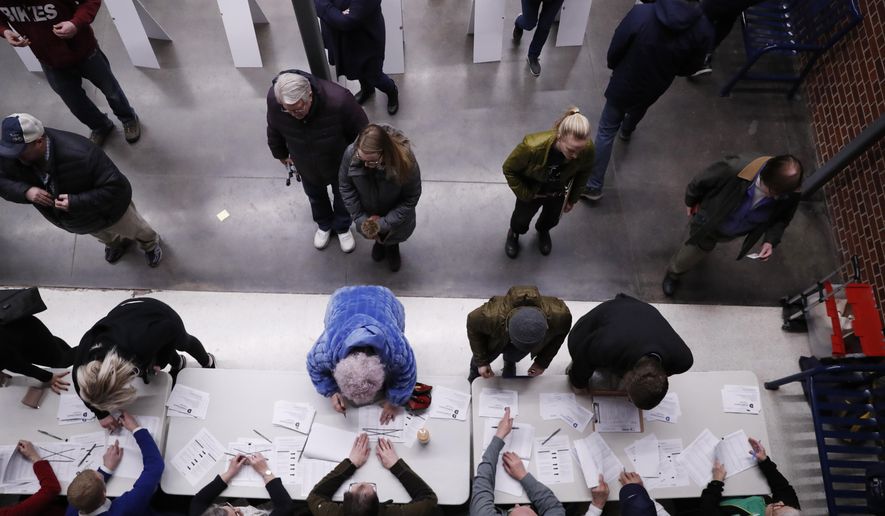ANKENY, Iowa — Bret Nilles, chair of the Linn County Iowa Democrats, felt as though things were going smoothly in the caucuses Monday night after reporting out the results from his precinct without any issues about 90 minutes after it began.
But he started to realize something had gone haywire when precinct chairs started trickling into the county’s election night headquarters from more than 80 caucus sites across the sprawling county with their cellphones on speaker-phone mode.
“As people were coming in, I could hear people on their phones with the music playing and they were saying they were trying to get through to the state party for an hour, hour and a half, in some places,” Mr. Nilles said. “It was the first time I have heard [call-waiting] music going on 10 different phones at the same time.”
The app that was being relied on to collect and report tallies from more than 1,600 caucus sites across the state wasn’t working so they were trying to phone in their results. Other precinct chairs across Iowa were doing the same, flooding the state party with phone calls and overwhelming the system.
“People had trouble logging in on the app, or they got hung up on submitting results,” Mr. Nilles said.
Similar stories played out across the state, with local officials saying the system apparently collapsed under the weight of all the data.
The New York Times reported that a technology company called Shadow Inc. developed the app, which the Nevada Democratic Party had planned to use for its Feb. 22 caucuses.
Troy Price, chair of the Iowa Democratic Party, said Tuesday the system broke down after a “coding” error resulted in only partial results being transmitted from precincts to the state party.
Mr. Price said the party hopes to release the final results Tuesday.
It was arguably the worst-case scenario for the Iowa Democratic Party and the antiquated caucus system, which was facing intense scrutiny before things fell apart in a most spectacular fashion Monday night.
Campaigns that had been crisscrossing the state in some cases for more than a year and invested tens of millions of dollars on setting up shop here and getting their messages out over the television and radio airwaves shuffled out of town shrouded in a political haze.
David Axelrod, a former senior adviser to former President Barack Obama, said it was a public relations disaster for Iowa Democrats.
“However bad the handling the count has been, the Iowa’s Democratic Party’s handling of the messaging around it has been an abject disaster,” Mr. Axelrod said on Twitter. “It should be taught in classrooms as an example of what not to do in a crisis.”
Another Democrat strategist bet that Mr. Price “had a bottle of bourbon last night.”
JoAnn Hardy, chair of the Cerro Gordo County Democratic Party, said it is a major letdown to what otherwise had been such an exciting campaign leading into the caucuses.
“It was very frustrating — very embarrassing, very embarrassing,” Ms. Hardy said. “We are the center of attention, and we couldn’t perform.”
She said that she wasn’t certain why the party had switched the reporting systems, but that it should have been better tested.
Mr. Nilles said he thinks the state party rolled out the app “too late in terms of giving people the opportunity to use it and test it.”
“In an effort to make it perfect, we made some improvements, but we made it overly complicated as well,” he said.
And that’s a shame, Mr. Nilles said, because several of the changes to the caucuses — including the introduction of presidential preference cards and the collecting of raw data from the precincts — had worked “better than I anticipated.”
“My initial thoughts are I could see where it is disappointing to the campaigns not to know the results, disappointing to all the staff and all of our volunteers in trying to get the caucuses right,” Mr. Nilles said. “We were really working hard with more training than we had ever done before to get the caucuses to go well, and the results tripped us up, and I see that is going to be a black mark against Iowa having the caucuses and going first.”
Ms. Hardy said she has never been a big fan of the caucuses because it disenfranchises voters that can’t make it out on caucus night and said there could be a silver lining to the chaotic ending to the fabled event.
“They have been tinkering around the edges of it, and I think all they have done is make it more complicated,” she said. “We have to simplify it, and it will require major change.”
Asked whether he would like to see the tradition to continue in future presidential election cycles, Mr. Nilles paused and then said, “You’ve got to give me a couple hours of sleep before I make that decision.”
• Seth McLaughlin can be reached at smclaughlin@washingtontimes.com.




Please read our comment policy before commenting.